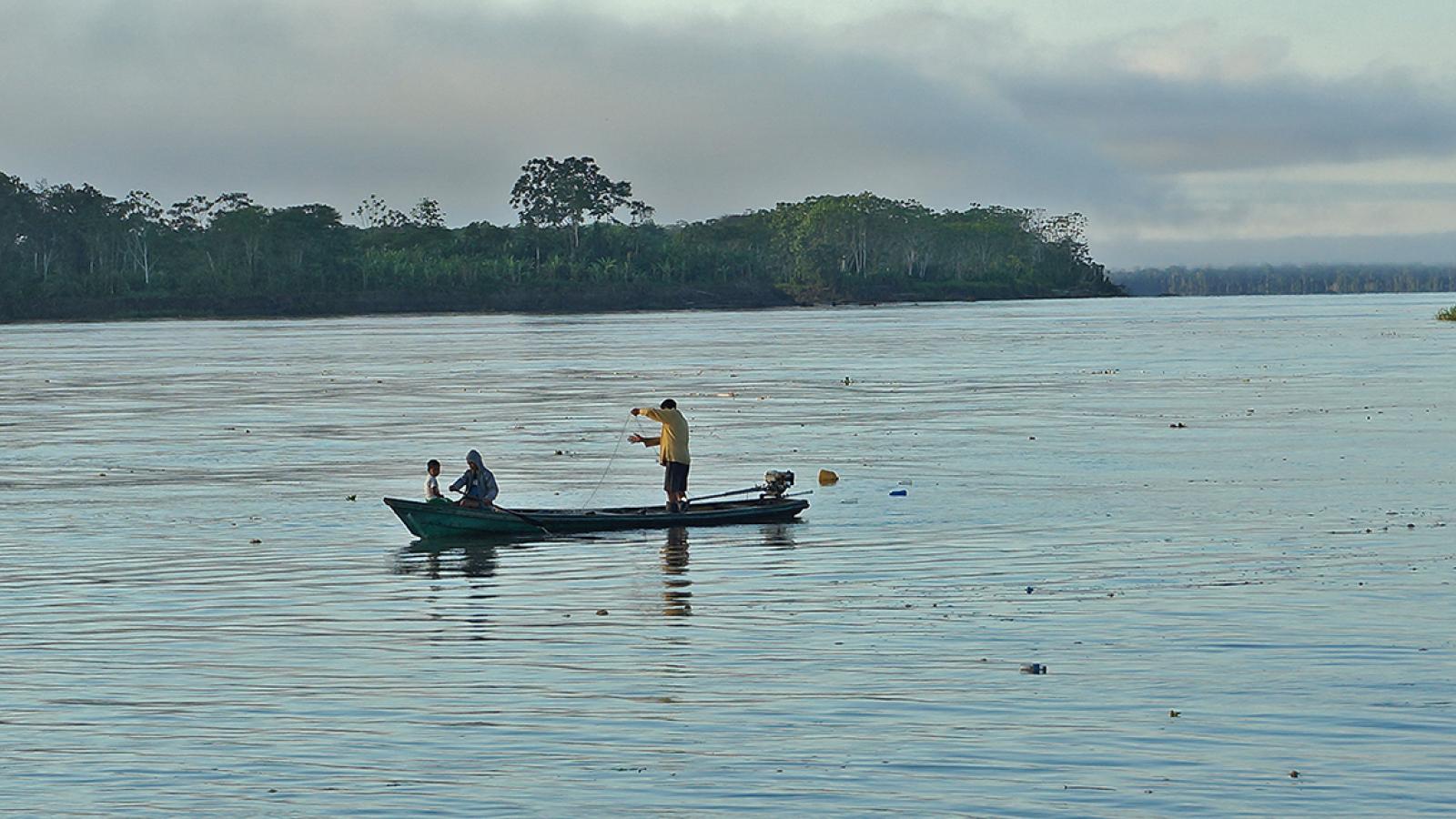Co-Producing Knowledge in the Peruvian Amazon
In 2022, a group of ODID’s doctoral students initiated the creation of the Co-Production of Knowledge (CoPoK) Fund. Its goal was to offer financial support for innovative projects that contributed to the co-production of knowledge between doctoral students and people local to their research sites and countries. It was intended as a response to extractive research practices and sought to enable more equitable and lasting exchanges. These projects have taken different forms – including the publication of a collection of oral histories for distribution to research assistants, interviewees and others in Mozambique and the co-production with community members of a policy report and a grant application for creative community storytelling in Ghana. Our DPhil student Theodor Borrmann used the grant to co-organise a workshop on how to fight the intrusion of commercial fishermen in the Orosa River, Peru.

During his ethnographic fieldwork in the Peruvian rainforest, our DPhil student Theodor Borrmann repeatedly heard of problematically diminishing fish stocks on the Orosa River in Peru. “There used to be plenty of fish,” observed Rocio, a research participant who lived with her husband and children in the Yaguan community of Comandancia. “My father used to hunt lisa, palometa and sabalo [coveted edible fish] with his spear. Nowadays, there is less. Sometimes there is no fish at all.”
For the riverine residents, the decline of fish threatens livelihoods and can significantly impair nutritional intake and health. And yet, it is difficult for them to prevent further declines, since the fish are plundered by commercial fishermen. These fishermen, who come from outside the area, are locally also known as congeladores, or freezers, since they use ice-filled containers to keep their catch fresh while taking them to the urban markets. What is particularly worrying about the congeladores is that they frequently throw poison into the river, despite it being illegal. They thus kill all the fish, even though they then only select the most profitable for their freezers, leaving smaller fish to rot and drift down the river.
“The small fish are just waste”, an enraged Rocio told Theodor.
Building resistance against illegal fishing
While in the field, Theodor once accompanied the well-respected Yaguan leader Manuel Ramirez Lopez to a reunion in the Yaguan community of Santa Ursula, about two hours upriver from his fieldsite. At the reunion, Manuel promoted the idea to organise a regional workshop and to collectively tackle the problem of commercial fishing. This idea was greeted with great enthusiasm. Since the communities on the Orosa River unfortunately lacked the financial means to hold the workshop straightaway, Theodor applied for a grant from ODID’s then newly-created Co-Production of Knowledge (CoPoK) Fund.
Co-creating knowledge to drive change
Thanks to the grant from the CoPoK fund, Theodor was able to follow up on the initiative from Manuel and co-organise the workshop with Manuel Ramirez Santana, the president of the local Yaguan federation, as well as with the regional non-profit organisations Centro para el Desarrollo del Indígena Amazónico (CEDIA) and Project Amazonas.
The day-long workshop, which took place in Comandancia in September 2023, brought together about 50 representatives from eight different communities, yielded different suggestions for tackling overfishing, and inspired residents to stand up together and defend their rights. “We have to be united!” Manuel Ramirez Santana emphasised in a speech, “Without fight, without force, it cannot be done.” The different representatives agreed that ecological destruction and the invasion of their territories needed to be stopped. Two experts from CEDIA joined the meeting via WhatsApp, with a microphone in front of the phone. They had initially planned to come in person, but low water levels had significantly increased the travel time, foiling their plans. Even remotely, however, they were able to suggest legal and practical options for protecting indigenous resources, and in an open and constructive discussion, participants shared experiences, asked questions and presented possible solutions, covering not only commercial fishing, but also threats from illegal hunting and forestry. The workshop ended with sharing food and manioc beer, an opportunity for people from different communities to socialise and bond.
Foundations for future change
As the Yaguan federation’s first large event for several years, the workshop provided an important step towards jointly defending and protecting the Orosa region’s resources, and signalled that the regional indigenous struggle is gaining momentum. In late 2023, federation representatives met again to sign the Declaration of Yanashi, asking Peru’s government to adopt “urgent measures to defend the territories of our communities, peoples, forests and natural resources against the threats of extractive companies and invaders, who undertake illegal activities that pose a serious risk to the life, health and safety of our families, and who loot our territories.”
The co-organised workshop may thus have not only helped in co-producing knowledge, but also in mobilising and uniting leaders of the region in a collective effort to improve the protection of Indigenous territorial rights and to safeguard against the exploitation of the river and forest environment of the Orosa River.
At ODID, we are hoping to encourage further students to collaboratively create knowledge with their research participants, forming more equitable and long-lasting partnerships.

